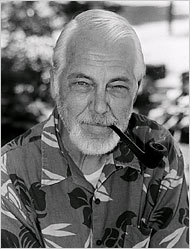David T. Lykken facts for kids
Quick facts for kids
David T. Lykken
|
|
|---|---|
 |
|
| Born |
David Thoreson Lykken
18 June 1928 Minneapolis, Minnesota, U.S.
|
| Died | 15 September 2006 (aged 78) |
| Alma mater | University of Minnesota |
| Known for | Twin studies, lie detection, set-point theory of happiness |
| Scientific career | |
| Fields | Psychology, behavioral genetics |
| Institutions | University of Minnesota, Deep Springs College |
David Thoreson Lykken (born June 18, 1928 – died September 15, 2006) was an American scientist who studied how our genes affect our behavior. He was a professor of Psychology at the University of Minnesota. He is best known for his research on twin studies and how to detect lies.
About David Lykken
David Lykken was born in Minneapolis, Minnesota. He was the youngest of seven children. When he was 17, he joined the United States Navy. After that, he went to the University of Minnesota. He studied psychology, philosophy, and math, earning his first degree in 1949. He continued his studies, getting his master's degree in psychology and statistics in 1952. He then earned his doctorate in clinical psychology in 1955.
He spent his whole career teaching at the University of Minnesota. He also taught for a while at Deep Springs College. He retired in 1998 but continued his work until he passed away in 2006. David Lykken had three sons: Matthew, Joseph, and Jesse, and ten grandchildren.
His Scientific Work
David Lykken started studying twins in 1970. He was a main researcher for the Minnesota Twin Family Study. This study looked at how much our genes (heredity) influence different parts of our personality and behavior. They did this by comparing identical twins (who share all their genes) and fraternal twins (who share about half their genes).
Lykken also developed a special idea called the "set-point theory of happiness." This theory suggests that about half of how happy we feel is determined by our genes. The other half is influenced by our life experiences and circumstances. His research showed that how cheerful or content someone generally feels often depends a lot on their genetic makeup.
He was also a member of several important scientific groups. These included the American Psychological Association and the American Association for the Advancement of Science. He often worked as an expert witness in court cases. He would share his knowledge about polygraph (lie detector) tests and personality assessments.
See also
 In Spanish: David T. Lykken para niños
In Spanish: David T. Lykken para niños
- Henry G. Lykken
- Joseph Lykken
 | George Robert Carruthers |
 | Patricia Bath |
 | Jan Ernst Matzeliger |
 | Alexander Miles |

